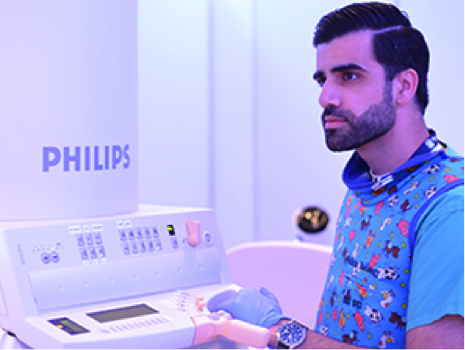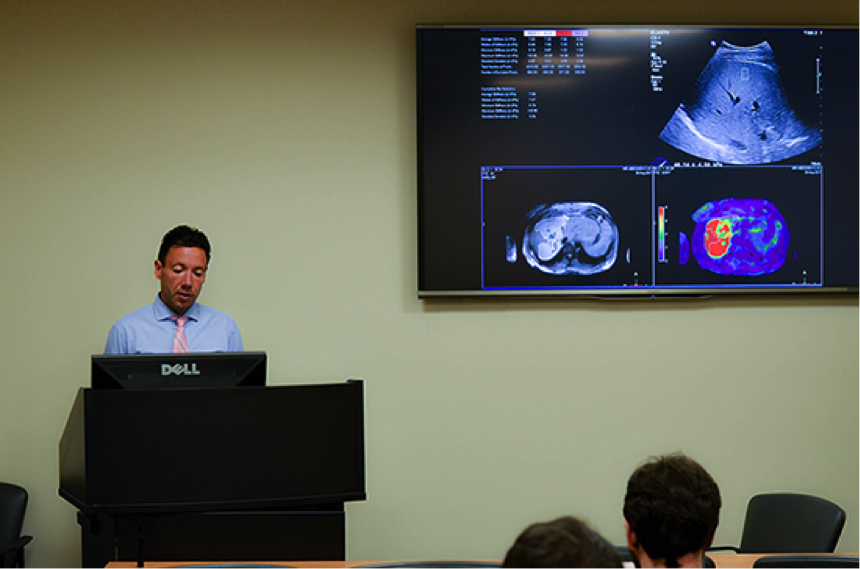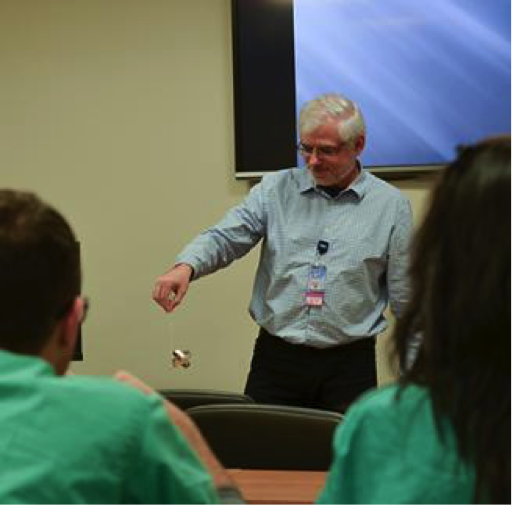 Call Responsibilities
Call Responsibilities
Our department remains committed to providing residents with the opportunity to take independent call,where they practice independent decision-making while acting as the first-line consultant to various medical and surgical services. The on-call resident is responsible for independently providing preliminary reports on all adult and pediatric emergency department examinations performed during his or her shift, including trauma and stroke codes, emergent inpatient examinations, and emergency department examinations at MidHudson Regional Hospital (remotely). The on-call resident may also perform a limited number of emergent sonographic and fluoroscopic examinations when clinically warranted.
We take immense pride in our residents’ ability to take independent call and in the high quality of care they provide during these shifts. Graduating and former residents consistently attribute independent call experience as a defining factor in their training and future success, as well as a standout factor in their fellowship applications. The on-call resident always has back-up available, if needed, from on-call neuro, body and interventional attending radiologists in our department with home workstations. We do not utilize teleradiology services.
Residents begin taking call at the start of their second year, after completing a dedicated call-preparation curriculum during their first year and being certified by the Program Director. Depending on class-year, residents work approximately 22-26 overnight and 4-10 daytime call shifts annually. Additionally, each week from Monday to Friday a resident is assigned to a “swing shift,” covering the evening period between the end of the work day and start of the overnight call shift (this resident arrives in the evening and is not assigned to a daytime shift). Residents taking call on a holiday are provided with an additional personal day as compensation. We fully comply with ACGME duty hour regulations, with the average resident work week ranging from 45-59 hours.
Resident Conferences
The learning experience at the workstation is supplemented by high yield hour-long daily conferences four days per week at 12:30 p.m. These conferences are planned based on a curriculum set by the academic committee and cover every topic that the residents are expected to have mastered prior to taking the CORE examination at the end of the third year and beyond. Practical physics applications are embedded into each lecture given by our faculty members. In addition, each Wednesday at 12:00 p.m. a dedicated physics lecture is given by one of the department’s physicists in accordance with a 12-month curriculum reviewed by the academic committee. This conference is followed by a 1:00 p.m. dedicated chest lecture.
The conferences tend to be didactic at the beginning of the year and then gradually transition to hybrid case/didactic conferences as the year progresses, with a focus on board preparation in the spring. Material at an appropriate level for each class is included. Each month, a special grand rounds conference is given by nationally and internationally recognized visiting professors from top academic institutions. Additional recurring conferences include journal club, presented by a resident and moderated by an attending, and missed case conference, the radiology equivalent of morbidity and mortality.
Radiology residents present cases at a weekly multidisciplinary tumor board. Additionally, residents attend specialty-specific tumor boards when on pertinent rotations. All third year residents attend the American Institute for Radiology Pathology (AIRP) four-week course in Silver Springs, Maryland. Residents also may attend review courses at Duke and the University of San Diego. Tuition for these courses, as well as a stipend for living expenses, is provided by the Department. The department also covers tuition and travel for second through fourth year residents to attend either the annual Head to Toe conference held at NYU or RSNA meeting. All residents are encouraged to be actively involved in research throughout their residency and present their works at national/international meetings.


Research
Our Department encourages all residents to engage in academic research, and opportunities to do so are plentiful. Recent residents focused on research have graduated with upwards of 50 publications, including both abstracts and full length peer-reviewed research papers. For any research endeavor accepted for presentation at a national meeting, the Department pays all associated expenses and provides the time to attend the meeting. Our residents consistently present at a variety of national and international meetings. Recent examples include:
- American Roentgen Ray Society (ARRS)
- Radiological Society of North America (RSNA)
- European Congress of Radiology (ECR)
- American College of Radiology (ACR)
- Society of Interventional Radiology (SIR)
- American Society of Neuroradiology (ASNR)
- American Society of Emergency Radiology (ASER)
- Association of University Radiologists (AUR)
- Society for Pediatric Radiology (SPR)
- Cardiovascular and Interventional Radiological Society of Europe (CIRSE)
Additional Benefits
Educational Funds
- A professional education allowance of $650.00 per academic year may be spent on books, electronic educational materials, board fees, and other training-related expenses.
- Funds can be used to purchase Apps for mobile and portable devices, tablets, computers, etc.
- Funds can also be used towards board fees and other training-related expenses.
Tablets
The Department provides each first year resident with a tablet that will allow them access to all resources they will need for their Radiology education, including electronic textbooks, videos, radiology apps and PACS access.
Board Review
Tuition, stipend for travel and living expenses, and time off are provided by the Department for multiple board review courses, including AIRP.
Attendance at National Meetings
Residents who have their research accepted for presentation (electronic, poster or oral presentation) at an academic conference will have their conference attendance funded by the program and provided with time off to attend.
Fellowship Preparation
Ample time off for fellowship interviews is provided, so that residents do not have to use vacation time.
Library and Facilities
Residents have access to the New York Medical College and hospital libraries and resources including online databases, electronic journals, multimedia and hard copy resources with borrowing privileges.